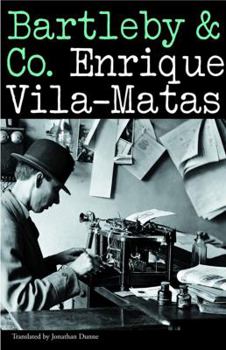Bartleby & Co.
Select Format
Select Condition 
Book Overview
In Bartleby & Co., an enormously enjoyable novel, Enrique Vila-Matas tackles the theme of silence in literature: the writers and non-writers who, like the scrivener Bartleby of the Herman Melville story, in answer to any question or demand, replies: "I would prefer not to." Addressing such "artists of refusal" as Robert Walser, Robert Musil, Arthur Rimbaud, Marcel Duchamp, Herman Melville, and J. D. Salinger, Bartleby & Co. could be described as a meditation: a walking tour through the annals of literature. Written as a series of footnotes (a non-work itself), Bartleby embarks on such questions as why do we write, why do we exist? The answer lies in the novel itself: told from the point of view of a hermetic hunchback who has no luck with women, and is himself unable to write, Bartleby is utterly engaging, a work of profound and philosophical beauty.
Format:Paperback
Language:English
ISBN:0811216985
ISBN13:9780811216982
Release Date:May 2007
Publisher:New Directions Publishing Corporation
Length:178 Pages
Weight:0.46 lbs.
Dimensions:0.5" x 5.3" x 8.0"
Customer Reviews
2 ratings
Playful philosophy
Published by Thriftbooks.com User , 19 years ago
As a long-time admirer of Melville's Bartleby, I loved this book. I loved its celebration of refusal and devolution. A novel that refuses to be a novel, the book is an especially good read for aging writers who may not have "fulfilled their creative potential" as the self-help goes. Though most of us know of the long silences of writers like Salinger, I had little idea how many writers have gone silent and for the most subtle of reasons.
To write or not to write.
Published by Thriftbooks.com User , 19 years ago
Bartleby and Co. is an excellent entrance to get into the extremely rich literary work of the Barcelonian writer Enrique Vila-Matas. Described as a "series of footnotes of an invisible -unexistent- book", it compiles, following a labirinthic order, the observations of an early-retired writer about a pretty recurrent phenomenon among writers that he calls the "negating literature" (literatura del no). Mixing reality and fantasy, Vila-Matas gives account of the most interesting cases of writers, like Bartleby or Salinger, who stopped writing for good at some point in their lives. It is also a marvelous tour through contemporary literature and, at a higher level, it can be seen as a metaphor of abandonment and negation that explores the reasons we have for writing and telling stories and also as a homage to all those brave men and women who have decided to devote their live to writing, who have taken such a dangerous (and slippy) path. A great follow up for this book, if you liked it, is "El Mal de Montano" (I'm not sure it's translated to english already).





